The Turtle Conservation Centre (TCC) is located at Cuc Phuong National Park, 120 kilometres to the south of Hanoi. It was established in 1998 by Fauna and Flora International (FFI) as the flagship for turtle conservation efforts in Vietnam and transferred to the management of the Park in 2002. The centre encompasses more than 2,000 square meters of terrestrial, aquatic, and semi-aquatic enclosures for turtles. There are over 1000 turtles at the TCC, representing 20 of Vietnam’s 25 native species. All of the turtles at the TCC have been either confiscated by wildlife protection authorities from the illegal trade or were born in captivity at the centre.
There is also a veterinary station and quarantine facility for new turtles and turtles receiving special medical attention, as well as two buildings for rearing hatchlings, an incubation room, a food preparation room, and an office. The construction of a new visitor interpretation close to the TCC was completed at the end of 2007 and final arrangements are underway to complete displays and exhibits.
The main activities of the TCC include:
- Establishment of assurance populations for priority turtle species.
- Raising public awareness about the threats to turtles.
- Training wildlife protection authorities.
- Building interest and expertise in turtles amongst the next generation of young professionals.



Conservation Breeding
The TCC conservation breeding program focuses on seven native endangered species (see in the table below). In 2007, there were 127 births of 11 species at the centre including six of seven priority species. In the past few years, the TCC has succeeded in breeding all of the priority species except (only a few eggs have been produced and there have been no successful births).

Conservation Breeding at the TCC

(Mauremys annamensis)

(Indotestudo elongata)
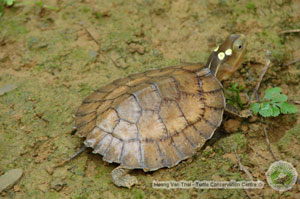
(Sacalia quadriocellata)
Enforcement training
One of major focus of the TCC is to train wildlife protection officers such as rangers and customs officers. In the past four years, in cooperation with the Asian Turtle Program (ATP), the Centre has conducted trainings for front-line officers on wildlife protection from more than 30 provinces. The trainees have been provided specialised training focused on the basic ecology of turtles, turtle identification methods and a review of the critical threats to turtle resulting from the trade in Vietnam and bordering countries like Cambodia and Laos. The training also covers basic instructions for dealing with confiscated turtles, and is intended to encourage local enforcement agencies to request help with confiscations involving turtles.
In 2007, the TCC and ATP partnership focused on Binh Phuoc and Tay Ninh provinces in the south of Vietnam, both of which incorporate key smuggling routes for wildlife from Cambodia into Vietnam. In May, training was carried out for customs and wildlife protection officers in both provinces. An additional training workshop was carried out for wildlife protection authorities in Dong Ngai province, a strategically important province through which virtually all south to north trade flows located along Highway 1.
New turtles received at the TCC



Raising awareness
Training and Capacity Building for Students and Young Professionals Keeled Box Turtle Research at Cuc Phuong National Park Cuc Phuong National Park is developing the first Chelonian Interpretation Centre in Indochina. The building, which lies within the TCC, was finished construction in the end of 2007 and is currently in the process of completing displays and exhibits. The centre will feature interpretive displays on the Asian turtle crisis and most of Vietnam’s 25 native species, as well as highlight many interesting aspects of turtle ecology. Three large display tanks and an egg incubation and hatchling viewing area are also located in the main building.

The next phases of the project will see the development of a large basking enclosure outside, an exhibit on Rafetus swinhoei, a trail zigzagging through turtles cages, a model of hunting camps, and a ‘turtle tower’ on the top of Mouhotii Hill, overlooking the TCC.
Training and Capacity Building for Students and Young Professionals
Together with the ATP, the TCC provides trainings and capacity building programs for students and young professionals with practical knowledge and skills to work on turtles, for the purpose of developing interests and expertise in turtles amongst the next generation of young conservationists and scientists. There were nine participants in the ten-day training course hosted at Cuc Phuong. Participants learned basic mapping and measuring skills, use of GPS, an introduction to radio telemetry, interview technique, turtle identification, and a range of other useful skills. The course is combined lectures with hands-on experience, using the facilities in the TCC to study in Cuc Phuong forest and local communities as field classrooms.
The TCC has hosted three annual field skills training courses since 2005. The next course is planned for March 2008, and another will be hosted in June 2008.
Keeled Box Turtle Research at Cuc Phuong National Park
The keeled box turtle (Cuora mouhotii) radio telemetry project at Cuc Phuong National Park was initiated in July 2003. The study involves use of radio telemetry to track the movements of a number of turtles that were captured and fixed with transmitters before being released back into the forest. In addition to learning about the home range and habitat of the species, activity periods, and gathering fascinating information from observations in the field, the study is used as a field component in ATP training programs, as well as to provide opportunities for students to gain practical skills and experience working with turtles in the wild.

There are currently seven turtles involved in the study, located in three study areas. The turtles are each tracked once each week by a local field team. During the month of August 2007, turtles were located every day through the month as part of a new study examining daily activity patterns during different seasons. Daily activity was also monitored during the month of December 2007 and will be monitored again in May 2008.
In addition to mapping movement and local environmental conditions, occasionally the field team has the opportunity to make interesting discoveries along the way. For example, on June 18 this year, one of the female turtles in the study area was observed nesting between the buttressing roots of a large tree. In August, a male was observed mating with a turtle that was previously unrecorded in the study. Two additional Cuora mouhotii were found during survey work over the past few months.
New facilities
Due to shortage of enclosures and cages inside the centre, many turtles have been kept in the quarantine area for more than three months. The Park Management Board approved a plan to expand the centre by about 500m. This allowed the TCC to build two new secure cages and six open enclosures.

movement of the perimeter fence
The two new secure cages were constructed in May and October of 2007 with support from the Ministry of Agriculture and Rural Development (MARD). The cages house a breeding group of Keeled box turtles (Cuora mouhotii), one of seven priority breeding groups in the park’s conservation breeding program for endangered turtles. Like other breeding enclosures at the TCC, the new enclosure includes a rich forest environment encompassing 84 square meters with logs and stumps, low vegetation, a functioning stream, and plenty of leaf litter.
In the past, the Centre is always in short of water in dry season, so the TCC manager proposed to the ministry to build a water tank inside the centre. By the end of 2007, a large 25 cubic meters tank was built to store water for the centre.
Thank you:
The Cuc Phuong Turtle Conservation Center wishes to thank the European Association of Zoos and Aquaria (EAZA) and the Shellshock Campaign for their generous support and assistance.
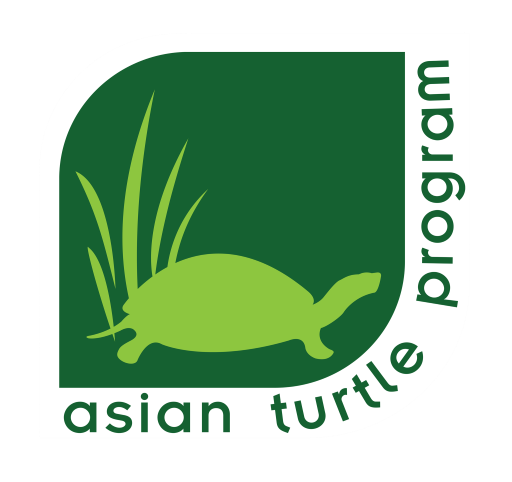


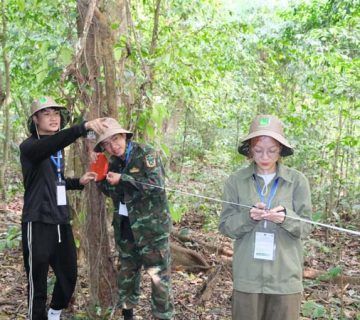
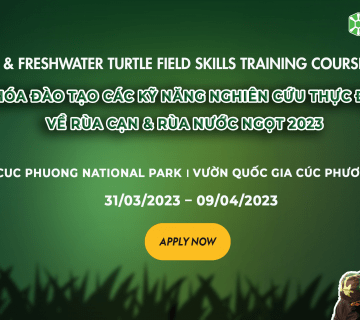


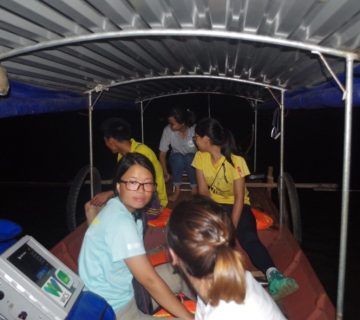

No comment